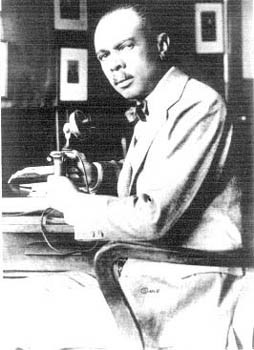James Weldon Johnson
Writer, Composer

1871 - 1938
Inducted in 2000
Biography
The legacy of James Weldon Johnson–Florida-born educator, poet, novelist, journalist, anthologist, diplomat, lyricist, lawyer and civil rights activist–stands as an icon in the cultural heritage of America's black community.
Born in Jacksonville in 1871, Johnson led a remarkable life and career that cast him as an emblematic figure in America's early-20th Century struggle with a racist and segregated society. For millions of black Americans of his day, Johnson stood as one of the nation's most revered beacons of hope for a better future.
In 1887, Johnson enrolled at Atlanta University where he distinguished himself in writing and as an orator. He eventually earned a graduate degree while founding a short-lived but notable campus newspaper, Daily American. As editor, Weldon showed a zeal for political activism. After returning to Florida in 1897, he soon launched a bold new career path, becoming the first African American to be admitted to the Florida Bar since Reconstruction.
But his broad interests and gifts–principally in poetry and music–steered him away from a typical law career. In 1901, he moved to New York to join his younger (by two years) brother, John Rosamond Johnson, a musical prodigy destined for his own outstanding career. For the next few years, Weldon traveled with his brother's popular music trio and helped write many of their songs. In 1905, Rosamond set to music a poem his brother had written (in 1899) and the result was "Lift Ev'ry Voice and Sing." The song became hugely popular among black congregations, and by the 1920s was being called "The Negro National Anthem."
In 1906, at age 25, Weldon returned to Jacksonville to accept a job as principal of the city's largest public school, the all-black Stanton School. He only served a few months before President Theodore Roosevelt tapped him for a diplomatic post as U.S. consul in Venezuela. But during his brief tenure at Stanton, Weldon made a profound change in the school's curriculum, installing two grades (9th and 10th) with courses in English composition, algebra, literature, physics, geometry, history and Spanish.
After two years in Venezuela, Weldon was appointed U.S. consul in Nicaragua in 1909. There he married Grace Nail, an artist he had met during his songwriting days in New York. During his six-year stint in the foreign service, Weldon became a published poet and an accomplished writer, publishing (anonymously) what would become his most famous book, The Autobiography of an Ex-Colored Man, in 1912.
Returned to New York in 1914, Weldon became editorial page editor for the influential New York Age, a black-owned weekly newspaper. Weldon's powerful editorials soon made him famous, and in 1916 he moved to Washington, D.C. to become the national organizer of the newly founded National Association for the Advancement of Colored People (NAACP).
During his 14-year tenure at the helm of the NAACP, Weldon's stature as a paramount political leader in the African-American community solidified, as did his stature as a poet and anthologist. He became a key figure in the Harlem Renaissance of the 1920s, publishing many memorable works, notably a collection of poems entitled God's Trombones: Seven Negro Sermons in Verse (1927). His contributions to African-American folklore included The Book of American Negro Poetry, which he edited in 1922, and two volumes of spirituals.
In 1930, Weldon resigned his post with the NAACP to accept a named professorship in creative literature at Fisk University in Nashville. He often lectured on the plight of black Americans, staunchly advocating for their civil rights. On a summer vacation in Maine in 1938, Weldon died in an automobile accident at age 67. In 1988, the U.S. Postal Service issued a stamp in his honor, and he is commemorated by numerous awards and scholarships in his name.
Related Links

